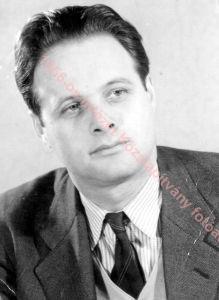| BIOGRAPHY |
|
| < back |
| Vásárhelyi, Miklós (1917[Fiume (ma: Rijeka, Horvátország)] -2001[Budapest, Magyarország]) | ||
| Born into a middle-class family in Fiume (now Rijeka, Croatia). His father was a bank official. The family moved to Hungary in 1929. He completed his secondary schooling in Debrecen. He then studied at the University of Rome in 1936-7 and in the Law Faculty of the University of Debrecen in 1939-42. He joined the Hungarian Communist Party in 1938. In 1938-41, he was secretary of the Social Democratic youth body in the Óbuda district of Budapest. During the war, he worked in a firearms factory as a member of the special labour service. He was in the armed resistance in 1944-5 as a member of an auxiliary unit. In 1945, he started work as a journalist on the paper Szabadság (Freedom). He soon joined the central communist-party daily paper Szabad Nép (Free People), becoming a member of its editorial board, and in 1946, its special correspondent at the peace negotiations in Paris. In 1948, he was one of the keynote contributors in the propaganda campaign against the church, over the Pótpetri affair. He was director of Hungarian Radio for a short while in 1950. He then became responsible editor of the paper Művelt Nép (Cultivated People) in 1951 and editor-in-chief of the magazine Hungary-Vegriya in 1952-4. He joined the Information Bureau of the Council of Ministers in May 1954, as its deputy president. He belonged to the inner political circle around Imre Nagy and was active in directing the opposition within the party. After Nagy was dismissed as prime minister in April 1955, Vásárhelyi was also dismissed and became the librarian at the Művelt Nép Book Publishing Co. At a party meeting of the Newspaper Publishing Company in May 1955, a call for clarification of Hungarian-Yugoslav relations and re-examination of the Rajk Trial by him and Miklós Gimes resulted in a grave party reprimand. In October 1955, he helped to prepare a memorandum addressed to the party Central Committee protesting against state control of culture, and for this was excluded from the Hungarian Workers' Party in December. The party's Central Control Committee restored his membership in 1956. On November 1, 1956, he was appointed press officer to Prime Minister Imre Nagy. After the Soviet invasion on November 4, he escaped to the apartment of the Yugoslav military attaché, while his family sought refuge in the Yugoslav Embassy. On November 23, he was deported to Romania with the Imre Nagy group from the embassy. He was arrested at Snagov on April 10, 1957 and transported to Hungary. On June 1958 he was sentenced by the Supreme Court to five years' imprisonment as the ninth accused in the trial of Imre Nagy and associates. He was freed in April 1960. In 1962, he started work at the Art Publishing Company, moving later to the Institute of Cinema and then the arts-oriented weekly Tükör (Mirror), and as an editor to Élet és Tudomány (Life and Science), from where he was dismissed in 1964. He then worked as a procurement clerk for a construction cooperative until 1972. From 1972 to 1990, he engaged in research into press and diplomatic history at the Hungarian Academy of Sciences' Institute of Literary Studies. He also began working as a scriptwriter at the Film Factory in 1973. In 1979, he signed a statement of solidarity with the imprisoned members of the Czechoslovak Charter '77 human rights movement. In 1981-2, he took part in 18 months of illegal round-table discussions on the history of the '56 Revolution. He was a guest professor at Columbia University, New York, in 1983-4. In 1984, he became the personal representative of György Soros on the committee of the Hungarian Academy of Sciences-Soros Foundation, of which he served as deputy president in 1991-3 and president until 2001. He gave a lecture at the Monor Meeting in 1985. In December 1986, he was one of the organizers and lecturers at a five-day conference on 1956 organized illegally in István Eörsi's home. He was a founder member in 1988 of the New March Front, and of the Historical Justice Committee (TIB) in the same year and then its president. In that capacity, he spoke at the funeral of Imre Nagy and associates on June 16, 1989. However, he resigned from the organization in 1992. In May 1988, he took part in the establishment of the Network of Free Initiatives, and in November in that of the Alliance of Free Democrats (SZDSZ), whose National Council he joined in 1989. He was an SZDSZ member of Parliament in 1990-94. Honours: Imre Nagy Memorial Plaque (1996), Pál Demény Memorial Medal (1997), Grand Prix of the Pro Renovanda Cultura Hungariae Foundation (1998). |
||
| ||||||
